
Looking for a UK SME Company List? Here’s a Better Option
If you’re looking for sales, partnership, or investment opportunities, it’s tough to identify the companies that meet your specific needs. That’s particularly true when you’re aiming to work with small and medium-sized enterprises (SMEs). There are millions of these companies, but there’s actually not much accurate information about them out there.
You may have noticed this for yourself if you’ve searched online for a UK SME company list. Many of the results are out-of-date, focused exclusively on particular regions, or contain a seemingly random assortment of companies. Even Companies House, the official register of UK businesses, cannot provide this. Instead, it states that company ‘directors are not obliged to provide CH’ with the data that such a list would require.
On the other hand, at Beauhurst, we have a complete list of all UK SMEs. We have data on over 13m UK companies, both active and inactive, no matter their size—that’s every single business in the UK. All that data is up-to-date, accurate, and verified by our team of experts.
However, you don’t need to sift through the entire list to find the information you’re looking for—whether that’s tech startups in Leeds, or small food brands in Scotland. Instead, simply search for the specific criteria you’re looking for and you’ll be shown only those companies.
In this guide, we show you how Beauhurst works, and highlight some examples of the information you can access through one of our platforms.
Want to see more about Beauhurst’s data? Book a demo with us to experience it for yourself. We’ve designed our database specifically with the public sector, professional services, investors, and company sales teams in mind.
Two ways to create your own list of relevant UK SMEs with Beauhurst
At Beauhurst, we have the largest database of UK company information available. Our company information database contains a dedicated profile of each British company, which we enrich with data from a range of sources—including HMRC, censuses, the companies directly, European patent data, the media, and more.
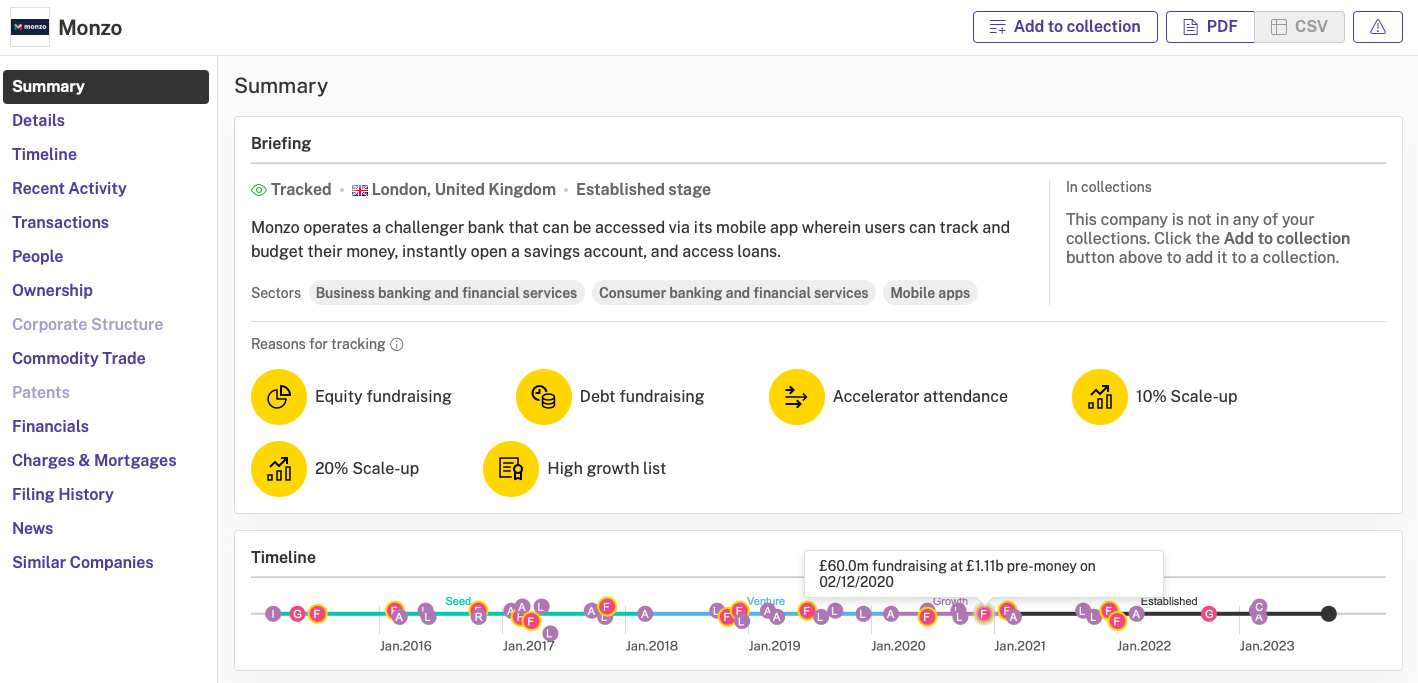
On each company profile, you’ll find all the information you need to get a full understanding of that business, including:
- Financial data, such as turnover and balance sheet totals, all easily accessible and comparable
- Employees, including their headcount and gender balance, plus the details of influential people such as owners, directors, and investors
- Operating headquarters, so you can understand the specific local economies to which the business contributes
- Key events, such as whether they’ve received funding, attended an accelerator, or spun out of a university
- Contact details
- And lots more—you can read more about the data we have and where we source it
This data is really useful for anyone looking to build relationships with businesses. However, not everyone knows the specific names of companies they want to engage with. That’s why we built the platform’s ‘Advanced Search’ function, so you can quickly find the specific businesses you’re looking for.
With Beauhurst, it’s really easy to find the SMEs or other businesses you’re looking for—through 2 main ways.
1. Simply search for companies that meet your specific criteria
You’ll rarely need a complete list of all UK SMEs in one shot (although you could access this through Beauhurst’s platforms, if needed). There are millions of SMEs, so finding the information you need from that list would require days of labour.
Instead, using Beauhurst’s Advanced Search, you can quickly access the companies that are actually relevant to you.
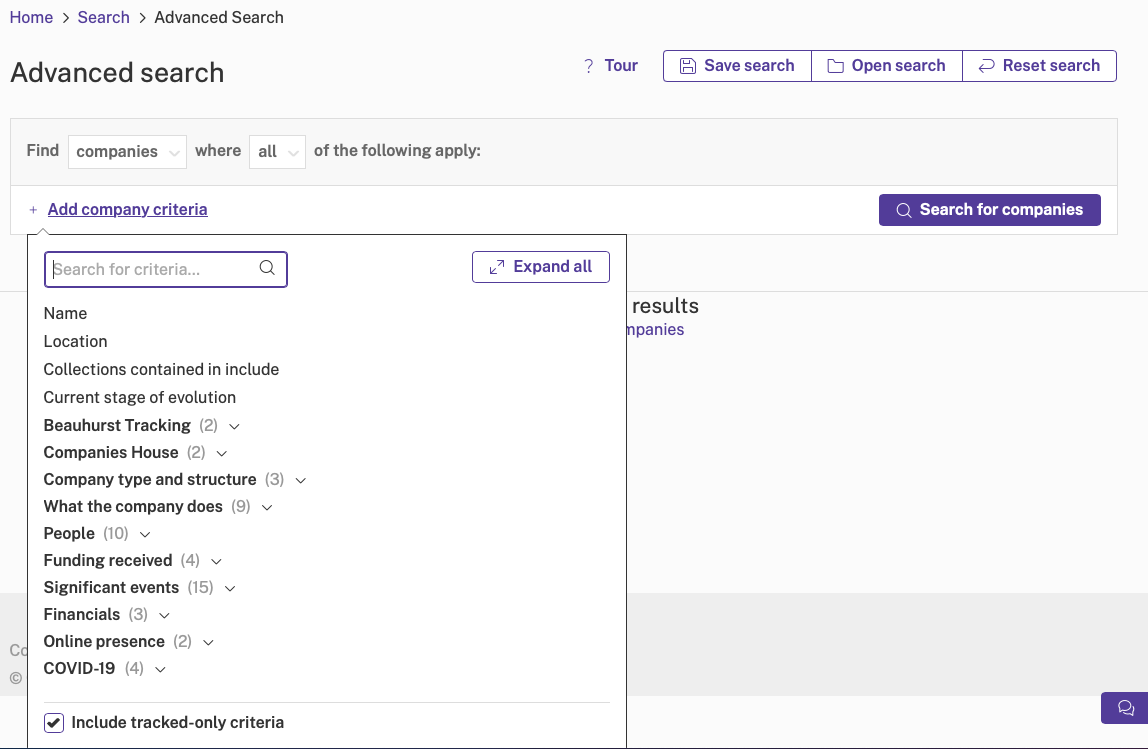
You can search by hundreds of different search criteria:
- Financial information. An SME is defined in the UK by having a turnover below €50m or a balance sheet total of below €43m (Yep, the UK uses € for this definition). You can easily add these criteria to your search to limit results to SMEs.
- Employees numbers. Similarly, SMEs have fewer than 250 employees. (But with Beauhurst’s Advanced Search, you can also search for influential people in a business, directors by gender, and much more.)
- Stage of evolution. This way, your search will only return startups, companies that are scaling, or established SMEs.
- Industry. Click on the 'What the company does' dropdown to search by SIC codes, target markets, commodity trade activity, or buzzwords. For instance, you can search for 'fintech' or 'foodtech' to find companies in these particular niches.
- Location. Search by companies’ head office, registered address, or trading addresses.
There are many more criteria you can search by, too. Plus, you can overlap all of these criteria to easily uncover the specific companies that match your requirements. For example, you could search for fintechs in Bristol with fewer than 250 employees, or SMEs based in Edinburgh that have a female director.
That’s exactly how the Lancashire County Council uses Beauhurst.
The Council’s team uses the Advanced Search to identify companies in the county that match their size criteria and profile.
‘I spend a lot of time looking at equity investment rates within Lancashire and using the platform’s Advanced Search tool to identify businesses that are raising equity,’ says Amin Vepari, Business Finance and Scaleup Lead. ‘With Beauhurst, we have access to real-time information, with a level of detail that we wouldn’t get anywhere else. And we can use this information to reach out to new businesses.’
2. Search for similar SMEs to companies you know
Alternatively, if you know a company already—an ideal client, say, or even a competitor—you can use the Beauhurst platform to find companies that are similar to them.
The platform identifies these using sophisticated machine-learning algorithms to match key company information with similar traits in other businesses. Our system will serve companies with a similar description, which can then be navigated by industry or region, employee numbers or turnover, and more.
For an easy way to identify opportunities that match your unique needs, you can simply click ‘Find similar companies’ on a particular company’s profile. Or you can access the same information through the Advanced Search.

For instance, this search for companies similar to Monzo produces over 100 results, including many fintech SMEs. It’s a much easier way to discover relevant businesses than searching through a complete UK SME company list.
Five examples of SME company lists you can build with Beauhurst
Every Beauhurst platform user has specific kinds of businesses they’re looking for—in different industries, locations, and stages of development. That’s why you shouldn’t use someone else’s SME company list to find opportunities. Rather, you should use Beauhurst’s data to build your own lists.
Here, we share 5 of the types of lists you can build with Beauhurst. Remember, this is just the tip of the iceberg—and you can easily find the information that matches your specific needs.
1. Top 10 fintech SMEs in Bristol (by fundraising total)
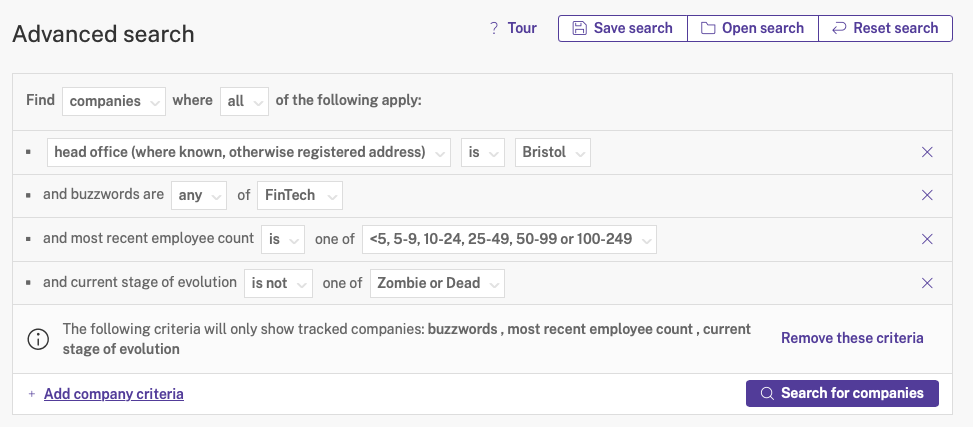
2. Top 10 SMEs making vegan/vegetarian products in the UK (by number of employees)
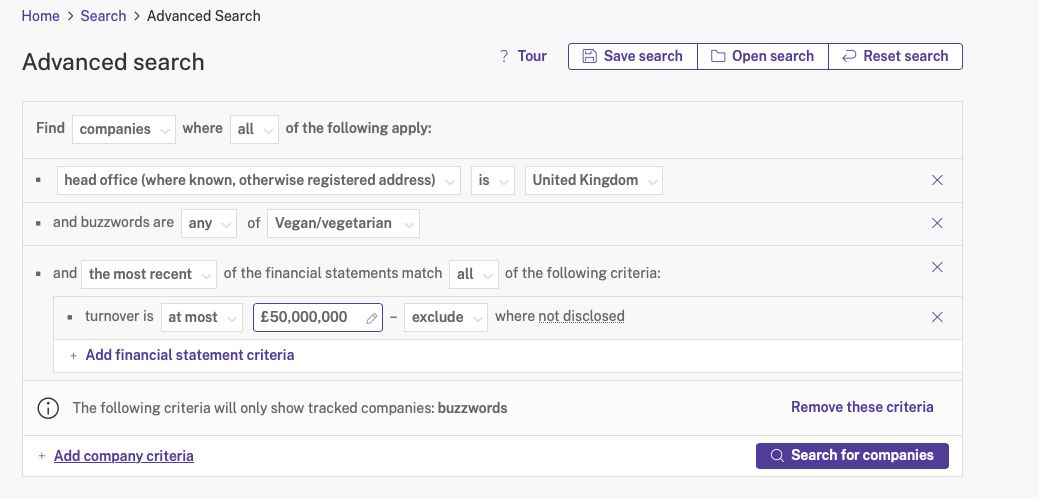
3. Active SMEs that are similar to Deliveroo
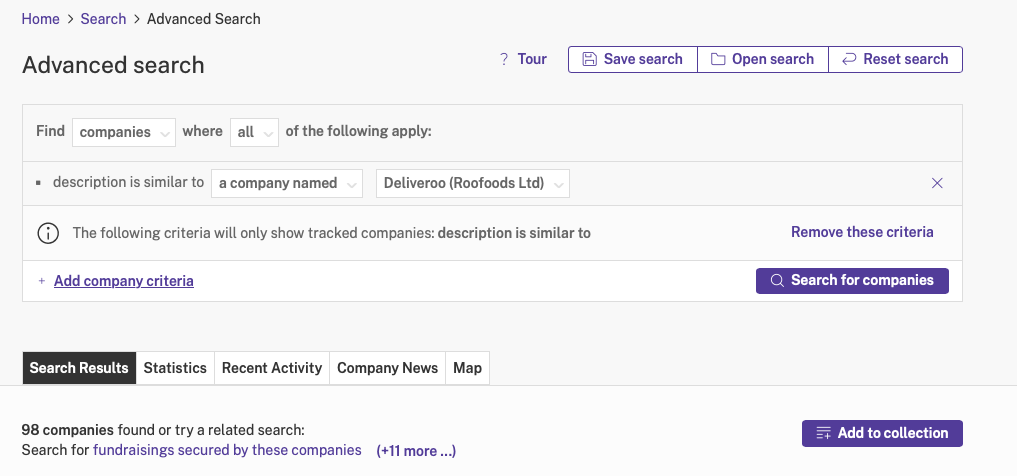
1. Adlove
2. AuthenticateIS
3. booknbook
4. Captain
5. Chivado
6. CityRadar
7. Cook & Thief
8. DeliveryApp
9. Devo
10. &Dine
4. 10 university spinouts in London (by turnover)
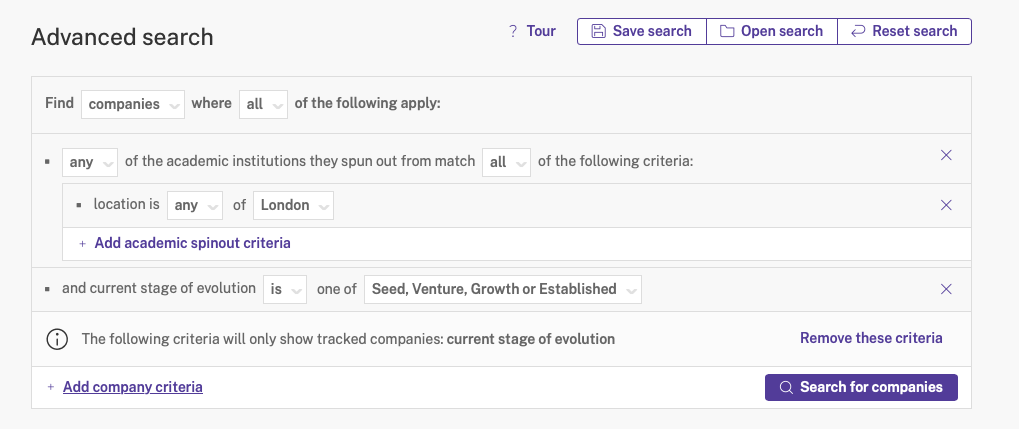
5. 10 largest SMEs with female directors
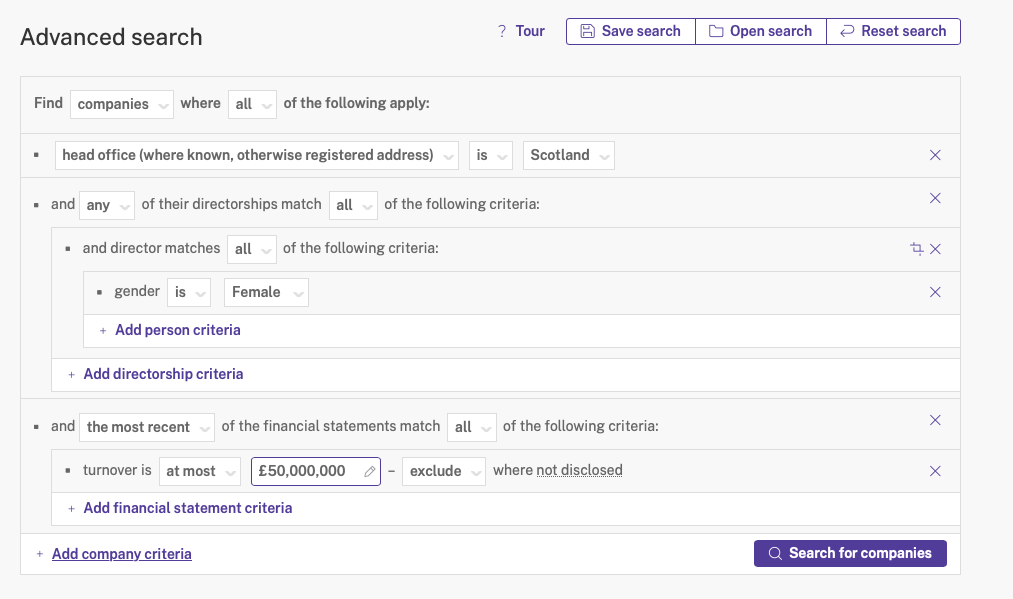
1. Bridgend Motor Group
2. Helix Well Ops
3. Personal Assets Trust
4. Dundas Chemical Company
5. NWH Group
6. Douglas Cameron (Perth)
7. Robertson Construction Tayside
8. McCurrach
9. James Fisher Nuclear
10. WM Donald
Three more tasks you can perform with Beauhurst
Discovering businesses to match your needs is not the only task you can do with Beauhurst.
Our platforms let you get deep insights into your regional business landscape, access data on individuals and entrepreneurs, and stay up to date on any business changes.
1. Track regional trends and patterns
Sometimes a simple list of small businesses is not enough. You might want to see a live picture of what’s happening in your local area, wherever you’re based in Britain.
With Beauhurst, that’s easy. When you use one of Beauhurst’s platforms, you get a view of the state of the local economy for any region within the UK, including growth rates, employment data, and aggregated information about different active sectors.
For example, you can see:
- The number of companies that have been found and that have ceased business
- An overview of the industries in which they’re active
- A breakdown of the number of employees in each company, presented by gender
- Top-level employment rates, job statistics, and the skills that are in highest demand
- News stories about specific businesses
- Other top-level trends
For instance, if you search Aberdeenshire, you get a picture of all the companies operating in that region:
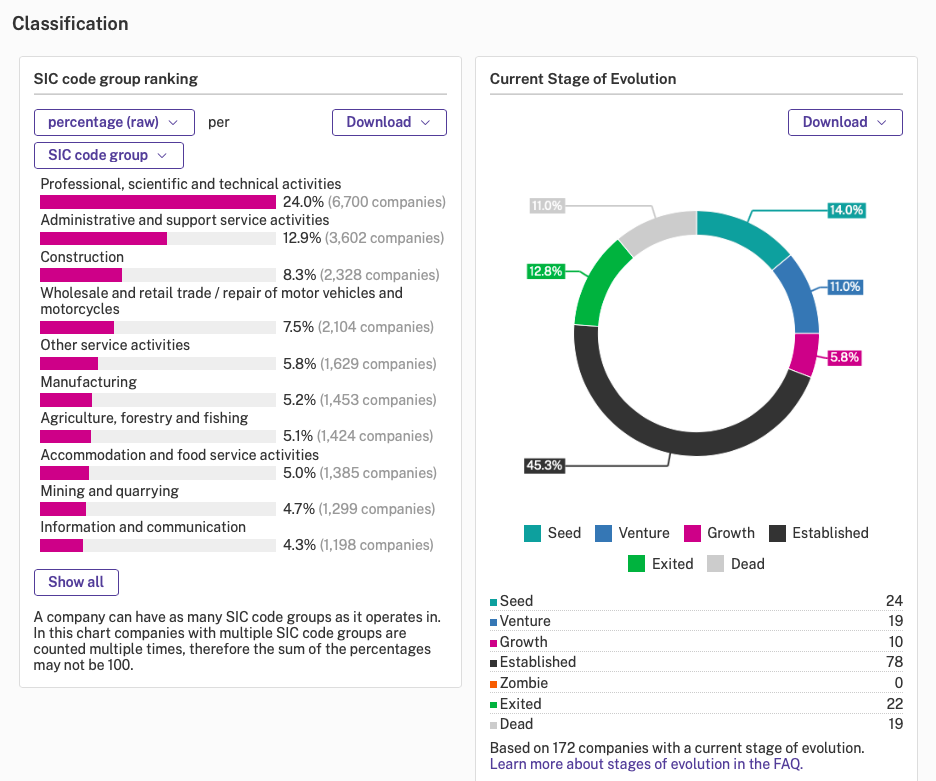
And then, if you want to, you can refine this information further. For example, you may want to focus exclusively on SME businesses, with employee headcounts lower than 250. Or you may choose to see just those companies that are in the growth or venture stage—for much more granular information on the businesses that match your needs.
‘The granularity of data on the Beauhurst platform is quite astounding’, says Jon Bass, Finance Specialist at the Coventry & Warwickshire Growth Hub. He uses Beauhurst to track local organisations and understand whether a business is a good match for their services. ‘I would say Beauhurst is a must-have. We may have needed to hire an extra team member if we didn’t have access to the platform.’
2. Discover key people in your business ecosystem
Alongside UK businesses, you can also use Beauhurst’s platforms to search for people who work at those businesses.
The database has profiles of over 20m business people from across the UK economy, including business owners, shareholders, and more. Our clients use this information to find high-quality leads and clients, extend their network, and source local expertise.
And just like with companies, you can search Beauhurst for these people, based on hundreds of different criteria:
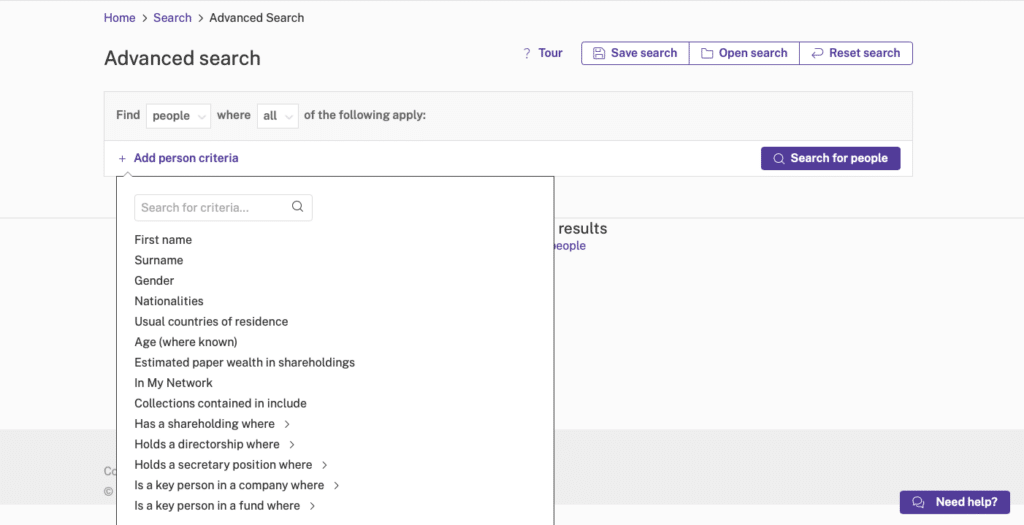
If you’re looking for expertise in a particular industry, you want to find who owns shares in a particular company, or identify someone relevant in your own network, you can simply set those criteria.
Then, you can access a wide range of information about them, including their past and present job roles, their contact details, their social media, and any other companies they’ve been associated with.
3. Be the first to know about any business changes
Another feature that many Beauhurst clients find useful is the ‘My Collections’ tab. Here, you can save any searches you make—for companies, funds, or people—and receive regular updates when anything changes that’s relevant to you.
This way, you’ll be the first to know if a company has just entered the regional market, if an SME has a new director, or if a startup has recently received funding.
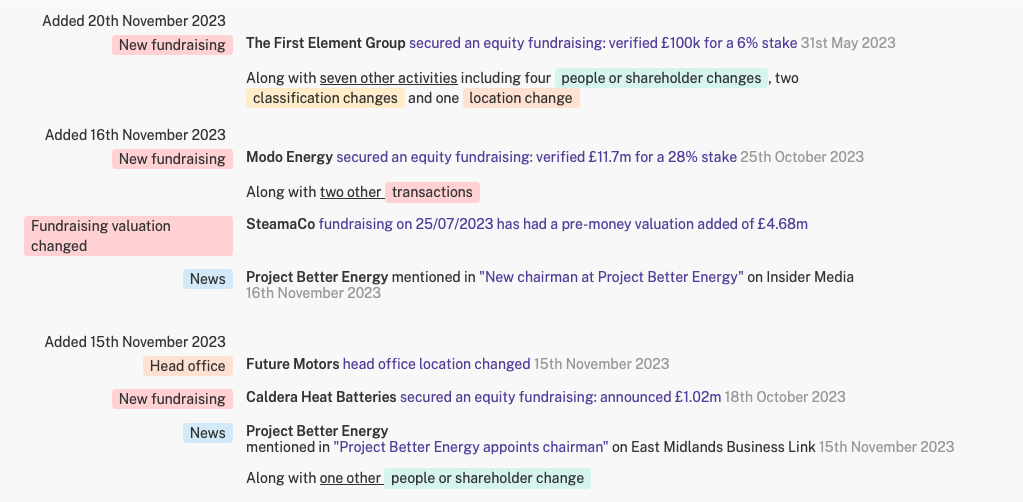
With these updates, you’ll have much more than just a standard ‘list’ of SMEs. Rather, you’ll have a live insight into any changes in your business ecosystem—meaning you can have complete trust that you’re using accurate and up-to-date information.
It’s really easy to set up these alerts. Simply make a search based on any of the criteria you’re interested in, and click ‘Add to collection’. All you need to do then is decide the information you want to be notified about, and how often.
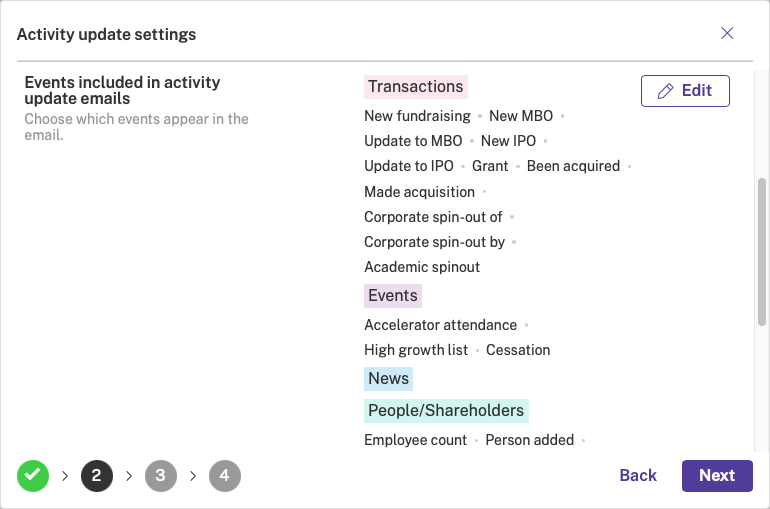
‘I have our 70+ alumni companies organised in a Collection,’ says Sue Hare, Operations Manager at the Science and Technology Facilities Council (STFC), who uses Beauhurst to keep track of companies that have participated in the STFC’s incubation programmes.
‘Every Monday, we receive tailored emails which summarise all the latest developments in the sectors and companies we’re interested in. I can quickly check whether any of the companies have completed a deal or have hit the news.’
Go beyond a simple SME list with Beauhurst
Don’t rely on someone else’s SME company list. Instead, use Beauhurst to build your own. With Beauhurst’s platforms, create a list of companies that exactly match your criteria. It’s the best way to identify opportunities for sales, investment, or industry partnerships.
Interested in seeing more of our UK SME company data? Book a demo with us to find out how it can work for you.
